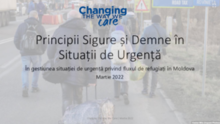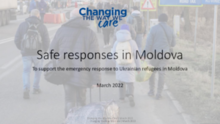This country page features an interactive, icon-based data dashboard providing a national-level overview of the status of children’s care and care reform efforts (a “Country Care Snapshot”), along with a list of resources and organizations in the country.
demographic_data
childrens_living_arrangement
children_living_without_bio
adoption
social_work_force
key_stakeholders
Key Stakeholders
Add New DataOther Relevant Reforms
Add New Datadrivers_of_institutionalisation
Drivers of Institutionaliziation
Add New Datakey_research_and_information
Key Data Sources
Add New DataDevelopment of Integrated Social Care Services for Vulnerable Families and Children at Risk in Moldova
Care Reform Workshop Report
Acknowledgements
Data for this country care snapshot was contributed by partners at Lumos and Changing the Way We Care.
Displaying 41 - 50 of 183
The European Commission has proposed a “10-Point Plan for stronger European coordination on welcoming people fleeing the war from Ukraine” (endorsed by the European Parliament and the Council) that includes: creation of an EU platform for registration; an EU level coordinated approach for transport and information hubs; and a call to enhance reception systems and ensure continuity of care and suitable accommodation, among others.
No country has taken more refugees per capita than Moldova, where people have opened their homes to Ukrainians. But the country faces challenges, including growing Russian pressure.
The International Data Alliance for Children on the Move (IDAC) held this webinar on April 11, 2022, to discuss the need for concrete data and information crucially needed to support affected children inside and outside Ukraine. Representatives of countries directly affected by the Ukrainian crisis as well as key partners on the ground shared their insights.
Instruirea „Principii Sigure și Demne în Situații de Urgență” oferă spre discuție subiecte importante precum responsabilitatea noastră de a proteja copiii și adulții expuși riscului în situația de urgență actuală; principiile „de a nu face mai rău
The training Safe Responses During Emergency Situations covers topics such as our responsibility to protect children and adults at risk in an emergency, the principles of 'do no further harm’ and 'best interests of the child’ in practice; the four Rs: recognition; response; reporting; recording and what we can and should practically do in an emergency situation.
Children make up half of all refugees from the war in Ukraine, according to UNICEF and UNHCR. More than 1.1 million children have arrived in Poland, with hundreds of thousands also arriving in Romania, Moldova, Hungary Slovakia and the Czech Republic.
The European Commission established the Solidarity Program which supports EU Member States and other States to share the responsibility of recieving refugees from Ukraine. The most vulnerable refugees will be prioritized for transfer, including people with disabilities, older people, those with severe medical conditions, and mothers with young children. Unaccompanied and separated children will only be transferred following best interest procedures and family tracing.
While most refugees, especially those from the Kyiv area, have flowed to Poland, an estimated 350,000 have entered Moldova, one of Europe's poorest countries.
This rapid training was designed to provide information to Moldovan foster families in preparation for fostering unaccompanied and separated children from the Ukraine. The training package includes a PPT and facilitator’s guide. Content provided during the six-hour training program includes basic information on childhood trauma, Adverse Childhood Experiences, key elements of PFA including Look, Listen and Link, and understanding how to both identify and support children who have lived through trauma and how it might manifest at different ages and stages of development.
Acest cod de conduită urmează să fie utilizat în timpul răspunsului de urgență al Republicii Moldova la criza din Ucraina. Ar trebui să fie susținut de toți adulții și copiii de peste 12 ani.





